In their own words: Couple helping guide Deerfield oral history project
| Published: 01-04-2023 8:51 PM |
While sitting at the kitchen table with her husband in their Sunderland home and sharing their decades of experience in recording American folklore around Appalachia, Carrie Kline found herself looking out at the birds on their porch.
Over the course of more than 6,000 interviews across 30 years of work, you tend to learn something about people, and Kline has observed that, much like her avian visitors, a common thread connects us all.
“We’re all different and that’s good; that makes life interesting,” Kline said. “We have different colors of birds I’m looking at, and different ways of climbing and flying and eating and different likes and dislikes, but our commonalities supersede.”
After meeting in the Pioneer Valley in the early 1990s, Carrie, 56, and Michael Kline, 83, spent 30 years together traveling through Appalachia as they highlighted the family stories, traditions and histories that paint a vivid picture of the people living there. Decades after meeting in western Massachusetts, the couple returned to replant their roots here in 2020 and have continued to produce their podcast, “Talking Across the Lines.”
Not content to spend their time just recording their own work, two Franklin County towns have enlisted the couple to train volunteers and record interviews for their 350th anniversaries. Carrie and Michael were first contacted by Northfield and began working with volunteers for that project. Among those volunteers was a Deerfield resident, who then put the Klines in contact with Deerfield’s 350th organizers, who have now brought the couple into an oral history project for that town.
“We feel one of the most effective ways to help this old world roll more peaceably is for people to be heard, to feel heard, to really feel listened to and to help people find their own voice” Carrie said. “And then, to share these voices in the context of others.”
Alongside their produced and cleanly edited work for broadcasts and podcasts, the Klines said the most important tool for sharing these voices in context are the raw interviews, which are often stored at public locations, such as libraries, so anyone can access and learn.
“The most obvious way is what we call a ‘voice bank,’” Michael said. “There will be these unedited, complete interviews in a voice bank that can be accessible to the community at all times.”
Article continues after...
Yesterday's Most Read Articles
 Political newcomer defeats Shores Ness for Deerfield Selectboard seat
Political newcomer defeats Shores Ness for Deerfield Selectboard seat
 Granby Bow and Gun Club says stray bullets that hit homes in Belchertown did not come from its range
Granby Bow and Gun Club says stray bullets that hit homes in Belchertown did not come from its range
 Annette Pfannebecker: Vote yes for Shores Ness and for Deerfield
Annette Pfannebecker: Vote yes for Shores Ness and for Deerfield
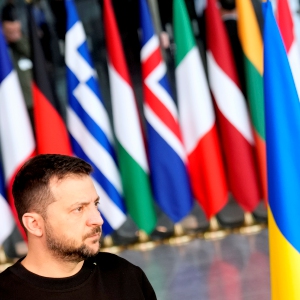 Susan Tracy: Support Ukraine funding
Susan Tracy: Support Ukraine funding
 Around Amherst: Bockelman joins in launch of governor’s housing push
Around Amherst: Bockelman joins in launch of governor’s housing push
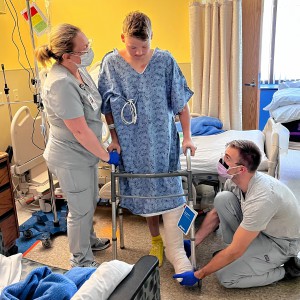 Defying the odds: Hadley’s Owen Earle back competing less than two years removed from horrific accident
Defying the odds: Hadley’s Owen Earle back competing less than two years removed from horrific accident
In Northfield, the Dickinson Memorial Library is the community’s voice bank for their 350th oral history project, while the Pocumtuck Valley Memorial Association (PVMA) will serve as Deerfield’s bank.
Oral testimony, the Klines said, carries a much stronger message than what can be read in a newspaper or on the internet because you can discern further meaning from someone’s words when hearing their tone of voice and delivery of words.
“It’s just as important how people say, as what they say,” Michael said. “How they say it is often lost in print. You certainly don’t get it in the same way as hearing somebody speaking from the heart about their life, or their family, or things that are important.”
Through their work, the couple have developed an interviewing technique — which they have also turned into a workshop — called “Listening for a Change.” The key point for the interviewer is to avoid putting any sort of pressure or guidance on where the person wants to go with their story.
“When we teach it, one of the things we say is, ‘We don’t know what this person is really an expert in. We know that everyone is an expert in their own experience’ … Interviewing is an act of humility, ” Carrie said. “It is amazing what people will tell you when you don’t ask.”
Michael emphasized their interviews are not the ones people imagine journalists or job interviewers to conduct, where it’s a “barrage of questions” being fired off, rather it’s a chance for a person to tell their own unique story, which can only be shared by them.
“I don’t think getting permission to do an interview with somebody gives you a right to go on a kind of a shopping trip, in a big-box store or something,” Michael said. “All of our interviews begin the same way no matter who we’re talking to, and that is, ‘Tell us about your people and where you were raised,’ and it goes from there.”
The goal of the project, Carrie stressed, is “always to give voice to people whose voices have not been heard … When, frankly, no one’s been heard in this manner: uninterrupted, without questions.”
This method has been applied to local communities as they embark on a year-long effort to record the oral history among them. In Northfield, Centennial House owners and 350th Anniversary Committee members Joan and Steve Stoia were the ones to enlist the couple to help preserve the countless stories of the town before the birthday celebrations in 2023.
Joan Stoia, who was among those trained to interview her neighbors, said the Klines are “remarkable” people, who have helped kick-start a project that will protect and enhance Northfield’s history.
“They just are kind, smart and experienced and they can put their finger on the pulse of what the person is saying, just by continuing to encourage that person,” Stoia said. “They have a pitch-perfect way of saying, ‘Tell me more about that’ and they get more.”
These exhaustive interviews are then edited and produced for whatever medium the Klines are working in. When working in Appalachia they compiled audio CDs — comprised of interviews and recorded folk songs associated with the period they explored — radio broadcast series and newspaper stories. As their work continued, they jumped into the 21st century with podcasts, where they now continue their work in the present day.
Like a weaver, producing these interviews into a cohesive project is often about untangling a web of interconnecting stories and histories. Carrie said the goal, beyond sharing these stories, is to provoke a “deeper community dialogue” between both the people that live there and the world as a whole.
“You get those incredible testimonials, these moments really, of personal transformation. People are rethinking or thinking more deeply about their own experience,” Carrie said. “You have these riches, these testimonials you can weave together.”
Some of these treasures have already been unearthed in Northfield, where Stoia said she and the other volunteers the Klines trained have conducted about 40 interviews for their project, with more on the way. She thanked the couple for their help and how “they’ve worked superbly” with the town.
“I could go on,” about how helpful the Klines have been, Stoia said with laugh.”The area is rich in meaning and the Klines are great in highlighting that meaning and bringing it out.”
For the Northfield and Deerfield 350th anniversaries, the towns are planning to take all of their oral history interviews and identify common threads between them to develop additional programming that will run throughout the year.
Asked what keeps them going after decades of work and thousands of interviews, Michael kept it simple.
“I’m a fool for a good story,” he said.
More information about the Klines’ work and their background can be found on their website: folktalk.org.
Chris Larabee can be reached at clarabee@recorder.com or 413-930-4081.

 A DIY approach to flying: Local pilots build and help build their own aircraft
A DIY approach to flying: Local pilots build and help build their own aircraft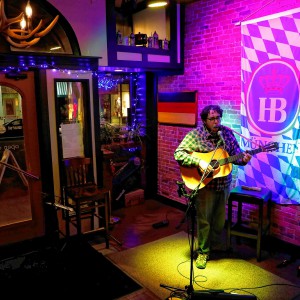 You’re up next: Western Mass open mic scene heats up post-pandemic
You’re up next: Western Mass open mic scene heats up post-pandemic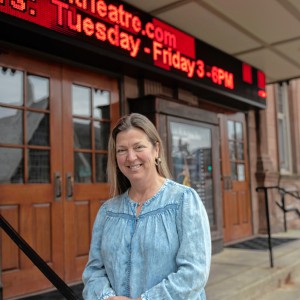 One upon a story slam: This year’s Valley Voices winners head to a final competition
One upon a story slam: This year’s Valley Voices winners head to a final competition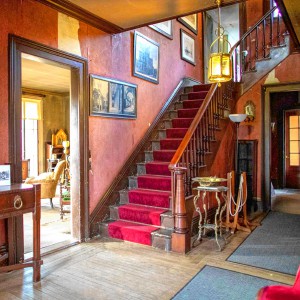 Preserving a key part of Emily Dickinson’s legacy: Historic Evergreens house reopens at the Emily Dickinson Museum
Preserving a key part of Emily Dickinson’s legacy: Historic Evergreens house reopens at the Emily Dickinson Museum